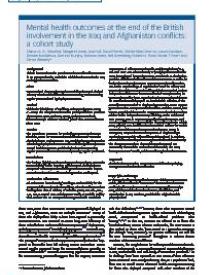Mental health outcomes at the end of the British involvement in the Iraq and Afghanistan conflicts : a cohort study
Background
Little is known about the prevalence of mental health outcomes in UK personnel at the end of the British involvement in the Iraq and Afghanistan conflicts.
Aims
We examined the prevalence of mental disorders and alcohol misuse, whether this differed between serving and ex-serving regular personnel and by deployment status.
Method
This is the third phase of a military cohort study (2014–2016; n = 8093). The sample was based on participants from previous phases (2004–2006 and 2007–2009) and a new randomly selected sample of those who had joined the UK armed forces since 2009.
Results
The prevalence was 6.2% for probable post-traumatic stress disorder, 21.9% for common mental disorders and 10.0% for alcohol misuse. Deployment to Iraq or Afghanistan and a combat role during deployment were associated with significantly worse mental health outcomes and alcohol misuse in ex-serving regular personnel but not in currently serving regular personnel.
Conclusions
The findings highlight an increasing prevalence of post-traumatic stress disorder and a lowering prevalence of alcohol misuse compared with our previous findings and stresses the importance of continued surveillance during service and beyond.
In: The British Journal of Psychiatry, ISSN 1472-1465 | 213 | 6 | December | 690-697
https://doi.org/10.1192/bjp.2018.175


